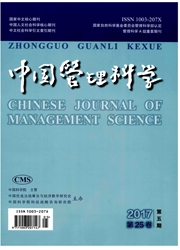

 中文摘要:
中文摘要:
本文探讨非对称信息下,制造商针对议价能力不同的大型及小型零售商分别采用了收益共享、批发价合约时,大型零售商的市场信息被制造商泄露给竞争对手,从而对供应链产生的影响。通过对比有无信息泄露下各方成员的博弈过程,分析供应链信息泄露的原理;进而在制造商总是会泄露信息的前提下,构建基于信号传递的信息泄露下供应链成员决策模型,分别讨论分离均衡与混同均衡两种情形下,零售商的订货策略及其相应的收益。在此基础上进一步做出扩展,制造商有主动权以选择是否泄露信息的情况,对比分析零售商的策略选择问题。经过分析发现,出于自身利益的角度,制造商总是会泄露信息,从而导致供应链的整体利润下滑。对此,大型零售商的订货策略选择与市场需求的波动程度有关:波动较小则选择混同均衡;波动较大则选择分离均衡。特别地,当市场需求为低时,大型零售商的最优订货量会向下扭曲,即支付一定的“信息租金”作为应对信息泄露的代价。
 英文摘要:
英文摘要:
Many upstream supplier may sell their products indirectly through various reselling channels, some large resellers is often better informed than the other small resellers of the market demand. It is as- sumed that the large reseller can observe the true market type privately, before production, while the smallreseller knows only the prior distribution of the market type. Since the small reseller does not observe the market demand directly, he may want to use the information revealed from the large reseller's order quan- tity though the supplier to make his decision on the direct sale quantity. Anticipating the supplier and small reseller's decision, the large reseller may purposely block information dissemination by ordering the same quantity for any market size or reveal the market size truthfully. So in this paper, how information leakage influences the supply chain strategic in the presence of asymmetric information is investigated, with different bargaining power of two retailers, when revenue sharing and wholesale price contract are used, respectively. This issue is discussed though a one supplier--two reseller setting where the supplier may leak the market information learned from order quantity of the large reseller who is better informed of the market size to a small reseller. The market information of large retailer is leaked to its competitor though the supplier thereby affects the supply chain. By analyzing and comparing the features in the process of the two retailers decision game in two cases, with or without the information leakage, the mechanism of supply chain information leakage under asymmetry information is revealed. Then under the premise of the assumptions that the manufacturer will always leak information, the decision-making model based on the signaling is constructed, to discuss the two retailers ordering strategies as well as profits un- der both separating equilibrium and pooling equilibrium. On the basis, the situation in which from the per- spective of own interests, the manufact
 同期刊论文项目
同期刊论文项目
 同项目期刊论文
同项目期刊论文
 期刊信息
期刊信息
